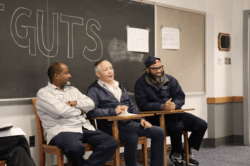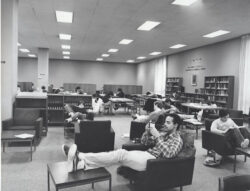During winter break, Georgetown University filed the final draft of its 2010 Campus Plan with the Zoning Commission. The Voice sat down with Advisory Neighborhood Commissioner Jake Sticka (COL ‘13) to discuss the plan. Interview transcribed and conducted by Geoffrey Bible.
Voice: What is your response to the 2010 Campus Plan?
Sticka: I think the plan is a good one, at least from a student perspective. It gets us a lot of things that we need and want. In terms of University response to community reaction, I think it’s been one of compromise.
The University has really engaged with the community, they’ve listened, and they’ve said, “We understand we’re in a broader community and we need to make some sacrifices.” So they sacrificed some graduate enrollment and the 1789 block.
I would hope that the neighbors would see that we’ve found a good middle ground. I don’t think that’s going to happen, but I hope it is.
With the 1789 block, were you disappointed to see that go or do you think it was a good compromise?
The 1789 block wouldn’t really help undergraduates. Some additional graduate housing and retail space would be nice, but I didn’t see that as a big facet of the plan that I wanted to support.
I think it was probably worth it for the University to drop it because of neighborhood concerns.
[Student advocacy group] DC Students Speak has encouraged students to sign a petition supporting the plan and to go to Thursday’s ANC meeting about the plan. Are you involved with this group?
I’m involved insofar as I know a lot of the people who are doing it, and I was more involved when it was a student information group, but now that it is active student lobbying, [they] involved me to look over things a lot. I sent out invites for the Facebook event because I think it’s great and I want to see students getting involved in these meetings.
Is there any other way, besides their Facebook event, that you think will get students involved in ANC-related issues?
I’ve talked with [Georgetown Universisty Student Association President Calen Angert] and [Vice President Jason Kluger] a bit about getting GUSA more involved with community issues and making it more prominent. What they do on campus is important, but other student governments in the D.C. area are involved with community issues and really take a lead on these issues. I really want to see GUSA do this going forward.
In regards to current off-campus housing, do you see it as problematic?
Not really. We just built Southwest Quad in 2003 and another 800 students came out of the community and back on campus. If anything, the issue is improving—if there is an issue—but on the whole, among the majority of the people I speak with, students have good relations with their neighbors. If neighbors are willing to engage with students and knock on their doors rather than call 911, then there will be much more fruitful relationships. That’s what we see in the majority of the cases, but it’s that minority that is very loud about the problems they see.
Burleith Citizens Association President Lenore Rubino wrote that Georgetown has presented “a disingenuous, sanitized story” with respect to the Campus Plan, but President John DeGioia called the plan “modest.”
I think it’s a fairly modest plan. Without the 1789 block plan and the smokestack, graduate enrollment is the major issue of contention. The graduate enrollment expansion’s affect on the community is not that bad. There were much more aggressive attempts to expand the graduate schools in the last ten years, and the affect on the community has been minimal. I think the University could be much more aggressive in their proposal and they have chosen not to be.
Have any of the ANC commissioners told you whether they are strongly one way or the other on the final plan?
I haven’t talked to any of them since we’ve seen the final plan. I don’t expect them to be particularly supportive, but I hope that if students do come out and show that they are part of the community, some of the commissioners will be willing to listen.




